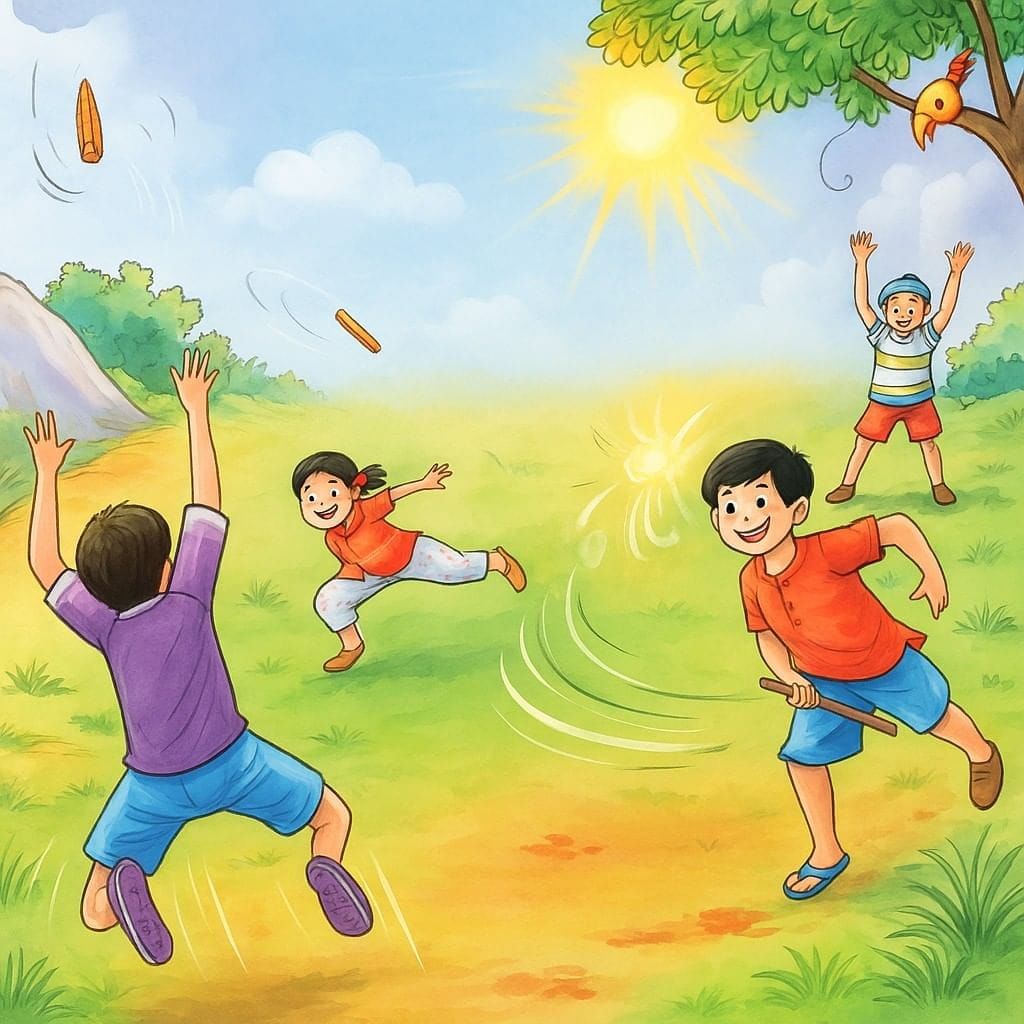Gilli Danda Chapter Notes | English Santoor Class 5 - New NCERT PDF Download
| Table of contents |

|
| Introduction |

|
| Detailed Summary |

|
| Theme/Message |

|
| Difficult Words |

|
Introduction
This poem takes us back to the joyful days of childhood, where fun was found in simple things. It celebrates the traditional Indian game of Gilli Danda, a game that doesn’t need any expensive toys - just a stick, a gilli, and a group of excited friends. Through cheerful verses, the poem shows how outdoor play brings happiness, energy, and unforgettable memories. It reminds us that the best moments are often created under the open sky, with laughter, sunshine, and good company.
Detailed Summary
First Stanza
In the playground, we gather around,
With a stick and a small gilli to throw,
Gilli Danda, our game is so sound!
We play with joy, watch it go
In this part, the children meet in the playground to play a game called Gilli Danda. They use a stick and a small wooden piece called a gilli. Everyone is excited and happy to play. They love the game and enjoy hitting the gilli to see how far it will fly.
Second Stanza
One, two, three, swing and hit,
With our friends, we never quit!
With every swing, we feel so free,
Oh, what fun it is, you see!
Here, the children count “one, two, three” and then swing the stick to hit the gilli. They play with their friends and don’t give up. Each time they play, they feel happy and free. Playing together makes the game more fun.

Third Stanza
The small gilli, up high it flies,
Underneath the bright blue skies.
Laughing, playing, having fun,
Under the golden rays of the sun!
In the last part, the gilli goes flying up into the sky. The children laugh and enjoy themselves under the bright blue sky and the warm sun. This part shows how playing outside with friends makes everyone feel happy and full of joy.
Theme/Message
- The poem celebrates the fun of playing outdoor games with friends. It shows how simple games like Gilli Danda can bring lots of joy.
- It tells us that we don’t need fancy toys to be happy - just a stick, a gilli, and good friends are enough to have fun.
- The poem also shows the beauty of being active and playing in the fresh air, under the open sky and warm sunshine.
- It reminds us how special childhood is, filled with laughter, friendship, and simple moments that make us smile.
Difficult Words
- Playground: A place where children play, usually with swings, slides, and open spaces.
- Gilli Danda: A traditional game from India that involves hitting a small stick (gilli) with a larger stick (danda).
- Experience: Knowledge or skill gained through doing something.
- Nostalgia: A sentimental longing for the past, often for a period or place with happy personal associations.
- Outdoor: Relating to, or located in the open air.
- Delight: A feeling of great pleasure or enjoyment.
- Gather: To come together or assemble.
- Exciting: Causing great enthusiasm and eagerness.
- Memories: Something remembered from the past; recollections.
|
40 videos|659 docs|63 tests
|
FAQs on Gilli Danda Chapter Notes - English Santoor Class 5 - New NCERT
| 1. What is Gilli Danda and how is it played? |  |
| 2. What are the benefits of playing Gilli Danda for children? |  |
| 3. Where did Gilli Danda originate, and is it popular in other countries? |  |
| 4. What are the rules and variations of Gilli Danda? |  |
| 5. How does Gilli Danda contribute to cultural heritage? |  |















